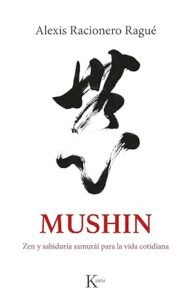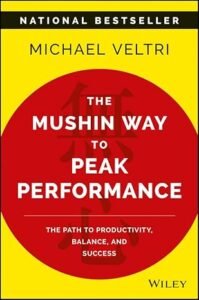Mushin: Open-minded and free from judgement

|
Getting your Trinity Audio player ready...
|
Have you ever imagined living a life without mental filters, where each moment is experienced with total presence and openness? This mental state, so desired by many, is known as Mushin.
The word Mushin, of Japanese origin, literally translates as “empty mind.” But make no mistake, this “emptiness” does not mean the absence of thought, but rather a state of mind free from judgments, expectations, and attachments. In this article, we will explore a little more about Mushin, understanding how it can be applied in our daily lives.
What is Mushin
Mushin is a Japanese concept that refers to a state of mind that is open-minded, calm, and non-judgmental. Literally, “mushin” means “mindless mind” or “empty mind.” This state of mind is characterized by full, attentive awareness, unconquered by thoughts, emotions, or attachments.
The concept of Mushin offers a path to this state of mental clarity, where we can act in accordance with our true nature, without being influenced by biases or negative emotions. But how exactly can we achieve this state? To understand this, we need to delve into the history and philosophical roots of Mushin.
History and origin of the concept of Mushin
The Philosophical Roots of Mushin
The concept of Mushin has its roots in Zen Buddhism, a tradition that values simplicity, meditation, and a deep understanding of the nature of the mind. At the heart of Zen is the idea that the mind must be free of all attachments, desires, and judgments in order to connect with the true self. Mushin represents this state of absence of mental distraction, where the mind is pure and completely present in the moment.
Mushin in Zen Buddhism
In Zen Buddhism, Mushin is often associated with the practice of meditation. Thus, during Zen meditation, the practitioner seeks to empty the mind of all thoughts, allowing only the “being” to remain. This state of “no-mind” is seen as a way to transcend the ego and achieve a deeper understanding of reality.
Mushin and Japanese martial arts
Node Bushido, the code of conduct of the samurai, Mushin is considered an essential quality for the warrior. In addition, Mushin is also a central concept in Japanese martial arts such as Kendo, Aikido and Karate. Practitioners of these arts seek the state of Mushin to react naturally and efficiently, without hesitation or fear. Thus, when a fighter is in Mushin, he becomes one with the situation, responding instinctively to threats without the interference of thoughts.
The Psychology Behind Mushin
The Science of the Empty Mind
The concept of Mushin may seem esoteric, but it finds support in modern psychology. Thus, when we are in a state of Mushin, we are essentially in a state of high concentration and focus, known in psychology as “state of flux”. In this state, the mind is so involved in the task at hand that all external and internal distractions disappear.
Neuroscience of flow state
From a neuroscience perspective, the flow state, similar to Mushin, is characterized by synchrony between various parts of the brain. Activity in the prefrontal region, responsible for critical thinking and judgment, decreases, allowing other parts of the brain, such as those associated with creativity and intuitive action, to take over. This, above all, allows actions to flow without the interference of rational thoughts, resulting in more efficient performance.
Comparison with other mental states
Although Mushin shares characteristics with other states of mind, such as deep meditation or flow, it is distinguished by its emphasis on spontaneous action. While meditation generally seeks passive stillness, Mushin is active and dynamic, applicable in situations that require quick, intuitive responses. This makes it especially useful in contexts such as martial arts, sports, and even business decisions.
Benefits of Mushin in everyday life
Reduced stress and anxiety
One of the biggest benefits of Mushin is the reduction of stress and anxiety. When the mind is free of judgment and worry, there is no room for negative or anxious thoughts. Instead, the focus is on the present, allowing you to face challenges with a clear and calm mind.
Better decision making
Decisions made in a state of Mushin tend to be more accurate and effective. This is because the mind is not burdened by biases or distorted thinking, allowing intuition and natural judgment to guide decision-making. So in a world where we are constantly bombarded with information, this mental clarity can be a real game-changer.
Improved performance in physical and mental activities
Mushin isn’t limited to the mental realm; it can also improve physical performance. Athletes who achieve this state report greater fluidity and efficiency in their movements, as well as greater resistance to physical stress. In this sense, the same applies to mental activities, such as solving complex problems, where the state of Mushin can help find solutions more quickly and creatively.
Mushin as a mental attitude towards life
In addition to its application in specific situations, Mushin can be cultivated as a general mental attitude for life. Embracing Mushin means living with an open, flexible, and attachment-free mind. This allows us to enjoy each moment to the fullest, face challenges with calm and resilience, and cultivate deeper, more meaningful relationships.
Mushin in practice: meditation and mindfulness
The practice of Zazen meditation, common in Zen Buddhism, is an effective way to cultivate the Mushin state of mind. During Zazen, the practitioner sits in an upright posture, paying full attention to the breath and the present moment. This practice helps to calm the mind, reduce thoughts, and develop deeper awareness.
The concept of mindfulness, or mindfulness, is closely related to Mushin. Mindfulness involves being fully present and aware in the present moment, without judgment or automatic reactions. Practicing mindfulness helps develop a calmer, more focused and open mind, essential characteristics of Mushin.
Mushin and the mindless mind
The concept of “mindless mind” is central to understanding Mushin. This does not mean having an empty, blank mind, but rather a mind free from attachments, judgments, and conditioning. A mindless mind is flexible, adaptable, and able to respond naturally and spontaneously to life’s situations.
Furthermore, an essential part of cultivating Mushin is letting go of attachments and judgments. Attachments to thoughts, emotions, possessions, or desired outcomes create suffering and limit our ability to live fully in the present. So by letting go, we make room for a calmer, more flexible, and freer mind.
Zen Buddhism emphasizes the importance of cultivating a “beginner’s mind,” a mental attitude of curiosity, openness, and willingness to learn. This beginner’s mind is essential to cultivating Mushin, as it allows us to see things with freshness and spontaneity. Thus, there is no limitation caused by prejudices or preconceived ideas.
Mushin and creativity
Cultivating the Mushin mindset can be extremely beneficial for creativity. In this sense, when the mind is calm, focused, and free from judgment, it enters a state of creative flow. In this state, ideas flow freely, innovation happens naturally, and creativity flourishes.
To access Mushin’s creative potential, it’s important to let your mind flow freely, without getting caught up in specific expectations or outcomes. Allowing your mind to explore, play, and make unusual connections is essential to creativity. Mushin helps you let go of control and let your creativity flow naturally.
In addition to individual creativity, a Mushin mindset can also drive innovation in teams and organizations. When people cultivate an open, flexible, and nonjudgmental mindset, they are able to collaborate more effectively, generate innovative ideas, and adapt quickly to change. Mushin is a quality essential for success in an increasingly dynamic world. dynamic and unpredictable.
Mushin and wisdom
Cultivating the Mushin state of mind not only has practical benefits, but can also lead to a deeper understanding of the nature of reality and human existence. Thus, when the mind is calm and free from distractions, it is able to penetrate deeper into phenomena and arrive at transformative insights.
Similarly, an important characteristic of Mushin is the ability to transcend dualities and opposites. Rather than getting caught up in concepts such as right/wrong, good/bad, win/lose, a Mushin mind recognizes the interdependence and relative nature of all things. This understanding leads to a deeper acceptance of life and a wisdom that goes beyond simplistic judgments.
Cultivating Mushin, above all, helps us accept life in its entirety, with all its ups and downs, joys and sufferings. Rather than fighting reality or trying to control it, a Mushin mind embraces life as it is, with compassion and wisdom. This acceptance does not mean passivity, but rather a deep understanding of the impermanent and interdependent nature of all things.
Embracing Mushin in your life
Cultivating the Mushin mental state can bring countless benefits to your personal and professional life. Developing a calm, focused, and non-judgmental mind gives us the ability to respond more effectively to life’s challenges, enjoy each moment to the fullest, and cultivate deeper, more meaningful relationships.
Additionally, Mushin can boost your creativity and innovation, allowing you to generate fresh ideas and adapt quickly to change. And on a deeper level, Mushin can lead to a wiser understanding of the nature of existence, cultivating a compassionate acceptance of life in its entirety.
So, start practicing Mushin today through meditation, cultivating mindfulness, and being willing to let go of attachments and judgments. With time and practice, you will develop an increasingly calm, flexible, and free mind—a Mushin mind that can face any challenge and enjoy every moment to the fullest.
Recommended reading:


The Mushin Way to Peak Performance: The Path to Productivity, Balance, and Success
Image: Freepik

Marcel Castilho is an expert in neuromarketing, neuroscience, mindfulness and positive psychology. In addition to being an advertiser, he also has a Master's degree in NLP – Neurolinguistic Programming. As the owner and founder of the communications agency VeroCom and also of the digital agency Vero Contents, he has been studying human behavior for over 30 years.

